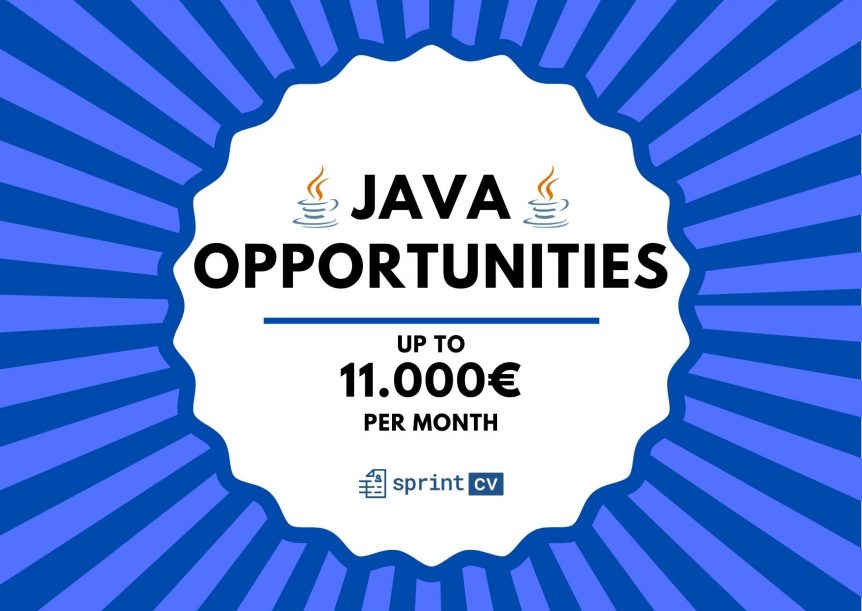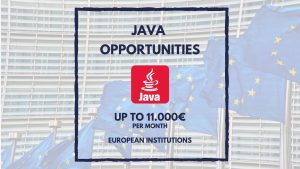
Are you a Java Developer? Work for European institutions and get up to 11.000€/month
As an effect of the pandemic, many tech professionals are out in the market looking for new professional challenges. If you are a Java Developer, the news couldn’t be better: the European Commission and other European institutions are hiring. If spending some days per month in Brussels and working for a highly regarded institution looks like your next life chapter – let us guide you on how you can get the job.
The pursuit of Javas
Did you know that Java was elected the main technology of development for the European Commission and many other European institutions? The core of the Backend applications is built in Java, Spring, WebServices and uses mostly Oracle databases. The European Commission uses Camunda as a BPM. The front end of the applications is built mostly in Angular, Javascript, CSS, and HTML. The testing is mostly done using Java, Cucumber, and Selenium. For analytics the preferred tool is ElasticSearch.
Also, the European Commission alone has more than 2.000 IT consultants. They support, improve, and build the IT systems that connect all the member states and build a better Europe.
More than half are Java experts working in Backend, Frontend, Cloud and Architecture roles. Therefore, there is a huge need for these professionals to join the projects and be part of the local team.
European Commission and European Institutions: great opportunities for Java professionals
The European Commission and other European Institutions provide a pleasant working environment with a great work-life balance. They never ask employees to do extra hours or work on weekends.
The salaries and rates are also very attractive for IT professionals. They are based on the professional’s degree and years of experience. For example, to receive 550€/day (11.000€/month gross), you should have a 5 years degree + 13 years of professional experience. The travelling and accommodation in Brussels will be at your own charge.
So, what is the drawback? Well, even though the future will be fully remote, you would need to work in Brussels some days per week. From September onwards, people will return to the office at least once per week, depending on the unit. From October 2022, the majority of external providers will be able to do full remote work from their home countries.
Joining the European Commission now would allow you to have a solid and better position to negotiate your future contracts. Also, it is still unclear when professionals will really have to return to the office, due to Covid-19 and its variants.
How is the recruitment process?
The recruitment process for these open positions is quite straightforward. Typically within a one-hour interview, you will know if you got the job. Usually, the interview has two parts. The first 30 minutes are to speak about you and the project, the other 30 minutes are technical questions. We advise you to the basic questions, they usually pop up.
European Institutions tend to hire based on soft skills and most of the people manage to get the job at their first interview. From our experience, we can say that the process is quite fast. If you are in the right place at the right time, in 15 days you can get the interview and the confirmation that you have the job. Of course, after this, you will activate your notice period in your current job. Typically the managers are comfortable waiting between 30-60 days for you to join the projects.
Bonus tip: you don’t need to be a super guru in your area. Currently, due to the lack of professionals, an average/good developer that is willing to work in Brussels one day per week, has a high chance to get the job. An important point is that the European institutions don’t discriminate against developers that have a longer experience and are currently in their late 40-50-60s. Actually, it’s the opposite, they prefer people that bring a lot of experience to the project.
Apply now and let us help you with the process
If working some days per month in Brussels and being a part of a large-scale project at a European Institution is an interesting opportunity for your career – we can help you get there! In one year, we helped more than 40 Java Developers get a project at the European Commission and other European Institutions and increase their quality of living and their salary substantially.
At Sprint CV, our main mission is to help IT consultants to improve and automate their CVs. We have also launched a free service where we help IT consultants to apply for open positions at the European Commission by helping them with the application and introducing them to hiring companies, direct providers of the European Commission and European Institutions like European External Action Service, European Parliament, Europol, etc. Just a small disclaimer, an external provider will be hiring through a consulting company with a direct contract with the European Institutions (outsourcing). You won’t be directly an employee of the European institutions.
By applying, we will review your CV/application, help you improve it, tell you how much you could get, identify the open positions that better fit you. Then, we will put you in direct contact with the delivery managers of the hiring companies, direct providers of the European Commission.
You can apply directly to some open positions using the link: Java opportunities at European Institutions paying up to 11.000€/month
Or contact our founder Marco Pincho directly on LinkedIn.
Let’s give it a try?
